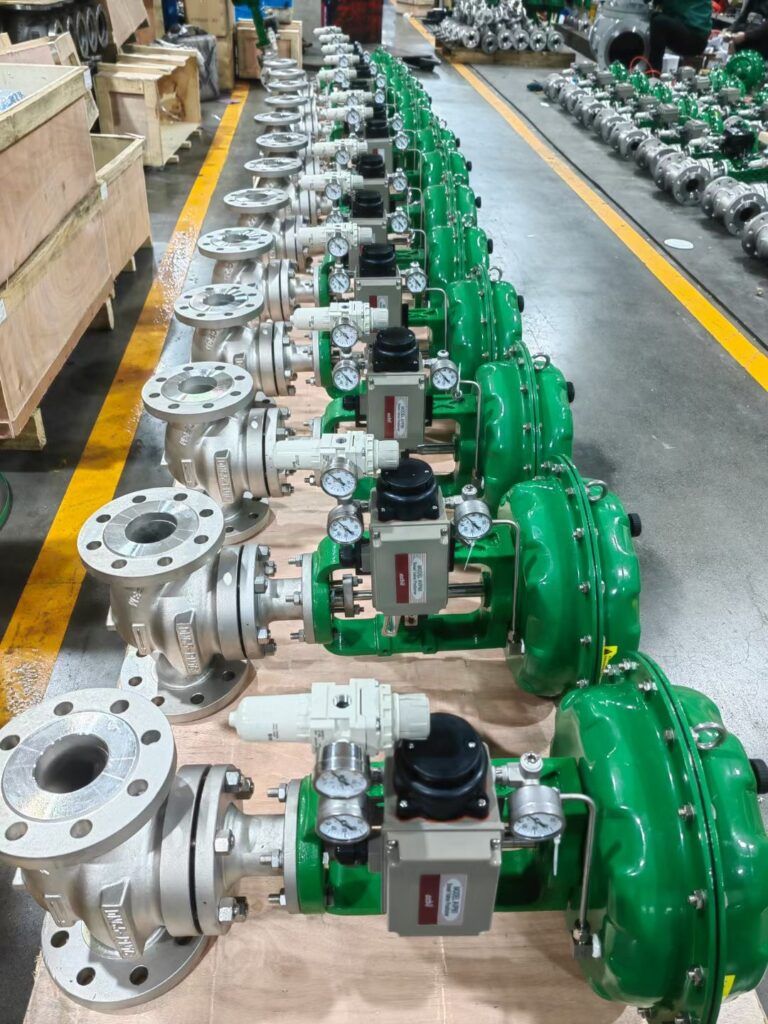BLOG
DELCO Valve leverer forskellige optimale løsninger til industrielle ventiler, især til reguleringsventiler.
TAGS
Kontakt os
Kontrolventil: Komponenter, principper og anvendelser
- Morgen Jiang
Control valves are essential in regulating fluid flow, pressure, and temperature in industrial process control systems. They help ensure that processes run smoothly, efficiently, and within specified parameters. Whether in the oil and gas, chemical, pharmaceutical, or food industries, control valves play a critical role in maintaining optimal system performance. This comprehensive guide will explore the components, working principles, and applications of control valves, as well as the advantages of sourcing them from reputable manufacturers like DELCO Valve in China.
Key Components of a Control Valve
EN control valve consists of several key parts that collaborate to regulate fluid flow and maintain system efficiency. The major components include:
Ventilhus: The valve body is the main component that holds all internal parts and directs fluid through the system. It impacts the valve’s flow characteristics and performance, ensuring durability under various pressures and temperatures.
Valve Trim: The valve trim includes components like the valve plug, stem, and seat, which control the flow of fluid. These parts are designed to ensure precision and high-performance regulation of fluid flow.
Aktuator: The actuator is responsible for driving the valve plug to open or close based on the system’s needs. Actuators can be powered by pneumatic, hydraulic, or electric sources, depending on the application.
Positioner: The positioner provides feedback to the control system by monitoring the valve’s position and adjusting the actuator accordingly. This ensures that the valve plug maintains the correct position for optimal fluid flow control.
Bonnet: The bonnet protects the internal components of the valve from external elements, such as moisture, dust, and heat, which could affect valve performance and lifespan.
Working Principles of a Control Valve
Control valves are designed to operate based on several key principles that allow them to regulate fluid flow in response to external control signals. The primary working principles include:
Opening and Closing: In basic applications, the valve plug moves between fully open and fully closed positions to control fluid flow. This mode is common in on/off applications.
Throttling: Throttling involves partially closing the valve plug to reduce the flow rate. This provides finer control over the flow of fluid.
Modulating: Modulating control valves continuously adjust the flow rate in response to real-time control signals, providing precise regulation of the fluid flow.
Types of Control Valves
Control valves can be categorized based on their flow characteristics. The most common types include:
Linear Control Valves: These valves have a direct, proportional relationship between the valve plug position and the flow rate. As the valve opens, the flow rate changes linearly.
Equal Percentage Control Valves: These valves have a non-linear relationship between plug position and flow rate. Small changes in the valve plug position can result in significant changes in flow, making them ideal for precise flow control at lower rates.
Quick-Opening Control Valves: These valves open rapidly, achieving full flow quickly. They are ideal for applications where a fast response is required.
Diaphragm-Actuated Control Valves: These valves use a flexible diaphragm to control the valve plug, allowing for precise, reliable fluid flow control.
Applications of Control Valves
Control valves are widely used in various industries for their ability to regulate flow, pressure, and temperature. Common applications include:
Flow Control: Control valves regulate fluid flow, ensuring that the rate is consistent and optimized. This is crucial for maintaining system efficiency and preventing damage to downstream equipment.
Pressure Control: These valves maintain constant pressure in the system, preventing dangerous fluctuations that could lead to equipment failure or unsafe conditions.
Temperature Control: By regulating the flow of heating or cooling fluids, control valves maintain the desired temperature, which is critical in many industrial processes, such as chemical reactions or food production.
Why Choose Control Valve Manufacturers in China?
Control valves are widely used in various industries for their ability to regulate flow, pressure, and temperature. Common applications include:
High-Quality Products: Manufacturers in China, like DELCO Valve, produce control valves that meet international quality standards. Advanced technology and rigorous testing ensure reliability and durability for various applications.
Cost-Effective Solutions: China is known for its cost-effective manufacturing capabilities. Choosing Chinese manufacturers helps businesses reduce production costs without sacrificing quality, resulting in significant savings.
Tilpasning: DELCO-ventil and other manufacturers in China offer customized control valve solutions tailored to meet the unique needs of your process control system. Customization ensures optimal performance and efficiency.
Expertise and Experience: With years of experience in the industry, Chinese manufacturers have in-depth knowledge of valve technology and process control systems. Their expertise allows them to deliver valuable insights and tailored solutions for complex applications.
Comprehensive Support: In addition to providing high-quality products, Chinese manufacturers offer excellent after-sales support, including technical assistance, installation, and maintenance services. This ensures that your control valves continue to function at their best throughout their lifespan.
Konklusion
Control valves are integral to maintaining optimal flow, pressure, and temperature in process control systems. Understanding the key components, working principles, and applications of control valves is essential for ensuring the smooth operation of industrial systems. By choosing high-quality, cost-effective control valves from experienced manufacturers like DELCO Valve in China, industries can improve system efficiency and performance. Whether used for flow control, pressure regulation, or temperature management, control valves are indispensable in achieving safe and efficient industrial operations.



